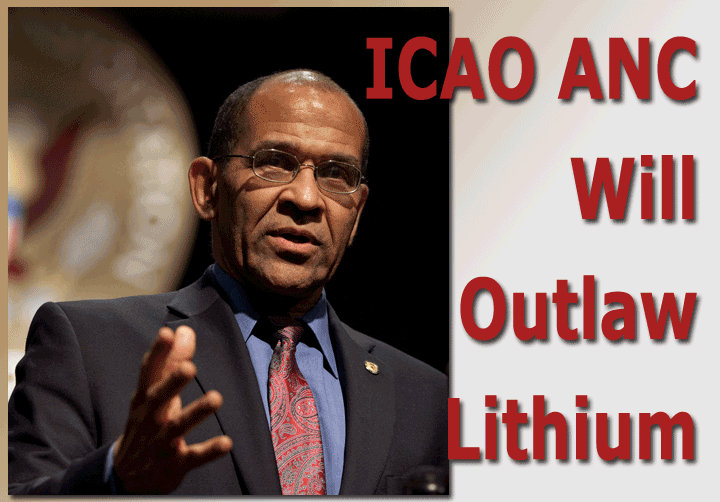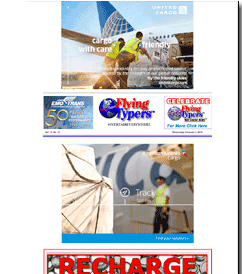
The Associated Press
reported on Wednesday, February 10th, that ICAO’s
Air Navigation Commission, (ANC), has recommended the
introduction of an outright ban on rechargeable Lithium
Ion batteries transported as shipments (UN 3480) on
passenger aircraft.
The decision on the ban
is to be made by the ICAO Council later this month and
could go into effect as early as April 1st, 2016, sources
say.
Hart
To Heart Of Lithium Cargo
“The National Transportation
Safety Board (NTSB) urges the Pipeline and Hazardous
Materials Safety Administration to take action on safety
recommendations to reduce the likelihood and severity
of potential cargo fires and to provide additional time
for the crew to safely land a cargo aircraft in the
event a fire is detected,” said NTSB Chairman
Christopher A. Hart as NTSB issued new safety recommendations
about Lithium Batteries on aircraft this past Tuesday.
“The NTSB wants
shippers to physically separate lithium batteries from
other flammable hazardous materials stowed on cargo
aircraft and to establish maximum loading density requirements
that restrict the quantities of lithium batteries and
flammable hazardous materials,” Mr. Hart said.
These recommendations
are the result of the July 28, 2011, investigation into
the in-flight fire and crash of Asiana Airlines Flight
991, which went into the sea near Jeju International
Airport.
“Lithium batteries
carried as cargo can be a fire and explosion ignition
source, a source of fuel to an existing fire, and subjected
to overheating that can create an explosive condition,”
NTSB said.
“PHMSA generally
cannot issue regulations or enforce requirements for
the safe transportation of lithium cells and batteries
that are more restrictive than international regulations,”
Mr. Hart said.
“But Congress has
given PHMSA authority to do so if it finds credible
evidence of a deficiency in the international regulations
that has substantially contributed to the start or spread
of an on-board fire.
“The NTSB strongly
believes the circumstances and findings in the Asiana
Flight 991 accident show the need for new cargo segregation
and loading density requirements,” the NTSB Chairman
concluded.
Some industry experts
who spoke to FlyingTypers on the condition
of anonymity find it both curious and a bit puzzling
that IATA has taken a pro-lithium position in light
of growing evidence that either severe restriction or
the move to completely ban pure Lithium battery shipments
is growing daily in the transportation business.
IATA has been quoted as
favoring lithium shipments, insisting regulators should
not “penalize high quality manufacturers and fully
compliant shippers” but should apply “the
full force of the law upon substandard manufacturing
and noncompliance with the dangerous goods regulations.”
Rejected
Batteries In Circulation
Rules and regulations
notwithstanding, here is a scenario that is a real eye
opener.
A representative of a
large battery manufacturer explained to FT that “as many as 30 percent of our batteries manufactured
in China do not meet our own stringent product safety
criteria and are therefore not approved for release
by our quality control.
“Apparently,”
the source said, “there have been cases where
the local contractor tasked with disposal of the rejected
batteries has sold the batteries—still bearing
our genuine manufacturing logo and marks—on the
grey market in the Chinese Pearl River Delta, from where
they have most likely been shipped elsewhere,”
the source concluded.
While the manufacturer
acted in good faith and followed all regulatory requirements,
apparently there are batteries in circulation which
are not counterfeit but still do not meet the applicable
criteria, and which can not be outwardly distinguished
from the batteries which met the manufacturer’s
criteria.
Jens
|





